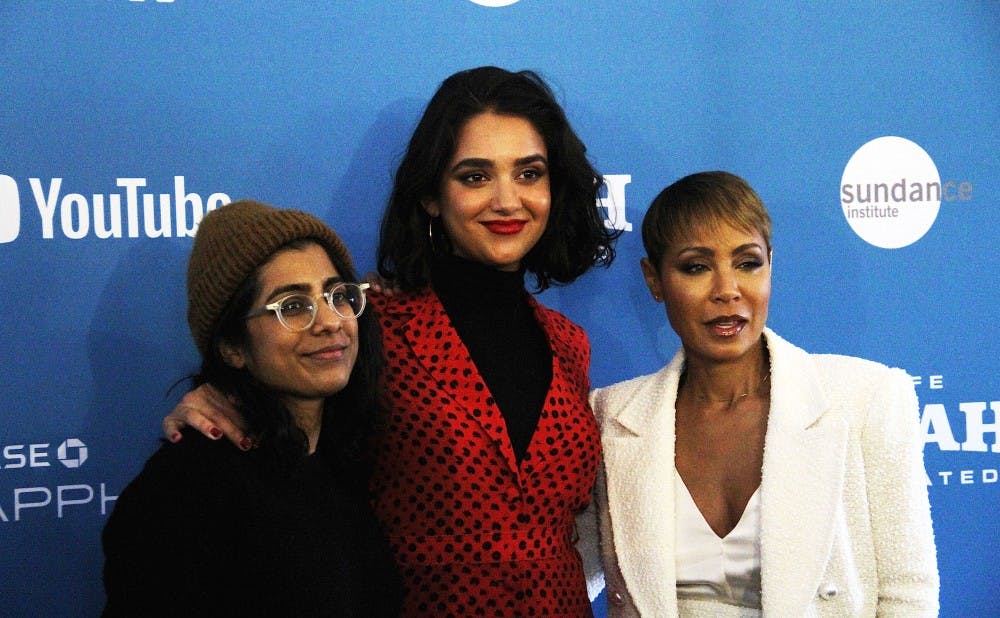Writer and director Minhal Baig’s coming of age drama “Hala” follows a Muslim-American teenager as she navigates her senior year of high school. For Hala, her culture and family are just as important as her American upbringing. As with any coming of age narrative, Hala’s interests further her development: She loves music and skateboarding and has a refined taste in poetry and its composition. As Hala (Geraldine Viswanathan) begins to explore her sexuality, her Pakistani background comes into direct conflict with her surroundings, and she must reconcile the opposing facets of her identity.
Baig’s first feature film, “Hala,” premiered at Sundance Film Festival Jan. 26. The Chronicle spoke to Baig and actress Viswanathan on the carpet of the premiere. This interview has been edited for clarity and length.
The Chronicle: The film comes at a time where Hollywood is beginning to realize the value in the stories of underrepresented communities. Why do you think that this particular story is relevant now?
Minhal Baig: The reason that I made this film is to normalize the experience of what it means to be Muslim-American and Pakistani-American and to show that it’s not so different. It was always the intention that the movie was a coming of age story that just happened to feature a Muslim protagonist. I hope the people who watch the movie are able to see themselves in it or see people within their community, and that they don’t regard [those people] as others.
TC: What kind of filmmaker do you think you are?
MB: As a writer, I think that I am very driven by characters and narrative. I have to be inside of their world and I have to feel that their perspective is unique. I want to dive in headfirst and fully understand what it is to be them.
TC: What can people learn from Hala’s perspective?
MB: I don’t think there are enough stories that feature Muslim-Americans as protagonists. You’re not getting to see the nuanced complications of being a hyphenate, being first generation and having to reconcile the differences of the western world and family heritage. I don’t think that there are easy answers. As a young woman, Hala is really trying to forge her own identity and that does not mean rejecting culture or rejecting faith. How can she incorporate that into her life while also being herself?
TC: Do you find that there are parallels in your own life?
MB: The story is largely drawn from my own life. My parents are immigrants from Pakistan and I grew up Muslim in Chicago. The story is very much drawn from my senior year of highschool. The most significant part of my coming of age was this changing relationship with my family, because it was the first time that I was preparing to go away and starting to be my own person. That wasn’t something that they were anticipating and I think it is reflected emotionally in the movie. There’s always texture — the characters speak the language I grew up speaking at home, Urdu, and they live in Chicago, which is important to the film. But it isn’t exactly one-to-one; it’s not fully autobiographical.
TC: What drew you to this particular project?
Geraldine Viswanathan: I just thought the script was so beautiful and the story itself was so refreshing. I couldn’t think of another coming of age story featuring a young Muslim girl as the lead. I thought you could really see Minhal’s point of view and it felt very authentic. I knew this would be a challenge because it is unlike anything I’ve ever done before.
TC: What did you draw from in your portrayal of Hala?
GV: I really drew from Minhal. It is based on her life, and the details are drawn from her experiences. We have had very different upbringings, but I think we relate, especially in having immigrant parents. I really had to mine her brain for every specificity in her life and in her point of view.
TC: Did you feel any connection to Hala’s character?
GV: I definitely relate to feeling like you’re on the outside. I grew up in a town where I was one of the only people of color and I know the isolation that [Hala] feels. I have also had to figure out my identity, especially within the context of ethnicity and culture, and how I fit in with the rest of my community.
TC: What was it like working with your co-stars and with Minhal?
GV: It was so fun. We were all just in it together. All of my co-stars were incredible and they were such a dream. It was also so great to work with Minhal. It was her first [feature] film and she had such a command on set. She had such an ownership of her story and we could all really feel her confidence.
Get The Chronicle straight to your inbox
Signup for our weekly newsletter. Cancel at any time.

